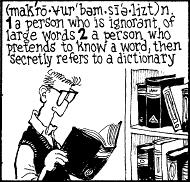 Over the weekend, Martin Longman asked a surprisingly deep question, “What’s your favorite word that you would never use in ordinary conversation?” A couple of people answered with expletives. Most answered with extremely obscure or specialized words like “depauperate.” But a few got at what I think is the heart of question with well known but not base vocabulary words like “scurrilous.” The word that immediately came to my mind was “pulchritude.” It’s a doubly hexed word, because the adjective — pulchritudinous — is totally unwieldy. But the point, at least to me, is that the vocabulary I use depends upon who I am talking to. And I’m not very comfortable with that.
Over the weekend, Martin Longman asked a surprisingly deep question, “What’s your favorite word that you would never use in ordinary conversation?” A couple of people answered with expletives. Most answered with extremely obscure or specialized words like “depauperate.” But a few got at what I think is the heart of question with well known but not base vocabulary words like “scurrilous.” The word that immediately came to my mind was “pulchritude.” It’s a doubly hexed word, because the adjective — pulchritudinous — is totally unwieldy. But the point, at least to me, is that the vocabulary I use depends upon who I am talking to. And I’m not very comfortable with that.
It is never my intention to use words that set me apart from other people. What’s more, I hope I never use language to show off my erudition — especially given that I am not all that well read compared to people I admire. Regardless, I’d like to think that I am confident enough about who I am that I don’t have to pretend to be more than I am. At the same time, there is a balancing act here. When communicating with others, you want to relate as equals. But you also want to be authentic, and sometimes I feel like a jerk when I make an awkward substitution.
There is a lot of judgement going on in doing this kind of thing. And that’s something that really bothers me. At the same time, I don’t think I look down on people with more limited vocabularies. For most of my life, I was the guy who was asking, “What does that mean?” And I’ll still ask that. I don’t feel that I have anything to prove; I’m just happy to learn a new word. But am I not depriving people around me of the same joy?
I don’t think that I am. My experience is that most people do not look forward to the opportunity to learn new words or whatever other knowledge clogs my brain. And if they do, they will let me know. You see, I don’t think I change my spoken vocabulary based upon my estimation of the listeners vocabulary. Rather, I change it based upon my assessment of their interest in such matters. I use whatever words come to my mind when I am talking to my close friends. For one thing, they already know that I’m a pretentious git, and they are too in their own ways (although they may not cop to this). And I know they will ask me if I use an odd work.
Any time that I’m interacting with someone I don’t know really well, I’m putting on a show for them. I’m trying to make the whole thing go smoothly. You don’t use nuance after dialing 9-1-1. And most of my personal interactions strike me as akin to a kind of emergency situation. Like a dysfunctional family during Christmas, I am just trying to get through this thing. With my friends, I can more be myself.
But I absolutely cannot imagine a time I would use “pulchritude” anywhere except as a joke. The reason is that the word “beauty” works as a perfect substitute. There are words that say more about the speaker than what is being said. “Pulchritude” is one of my favorites. And since I don’t ever want to use the language for that ignoble purpose, I don’t use the word even with friends.






I too read Longman’s post and found it interesting. I think it goes to intent. If you use unfamiliar (to most people) words in conversation just to show off
you will be branded as a snob. If it is natural for you to use such words, I think it is OK. Books I read often use words like: epistolary, ineluctable, empiricism etc. It sends me to the dictionary and that’s OK. I learned a new word. It’s fun to learn.
I think there is also a question of etiquette. Clearly, William Buckley only used words that came naturally to him. But his pointed use of obscure words was intended to highlight differences. Of course, he would have been a snob regardless of what words he used.
Then again, whatever the dictionary may claim, it’s rare to find a word that is a true synonym — there are overtones and shades of meaning and even as you say, calibration to your audience. As Mark Twain pointed out, using a word that is similar but not quite right is akin to hitting a musical note that is off-key. If conversation is a performance, then specific language is one of the ways one stays “in character” as well as a way to be entertaining. Even when clarity is primary it isn’t necessarily the only goal.
Regarding limited/expansive vocabularies: I heard of an interesting study some years ago. It had found that multi-lingual speakers tended to have more limited vocabularies within a given language than the mono-lingual. As if there is only so much storage space available in your mental “stack”, or perhaps only so much time to learn new words. Didn’t stop me feeling inadequate due to my lack of multi-lingual fluency though.
Interesting study, but I can think of other reasons why that might be.
I agree with what Twain said. But I don’t agree about definitions. Most people don’t know the difference between “stupid” and “fatuous.” As I’ve gotten older, I’ve seen language much more in musical terms. There is rhythm, cadence, timbre. Clarity, of course, comes first in writing. But after that comes sound. And in speech, sound generally comes first. But usually when I’m trying to remember a particular word, it isn’t because it’s meaning is just right, but because it just seems to fit given the many other aspects of the writing. In fact, if the meaning of a thought is too dependent upon a precise word choice, you likely have a bigger problem.